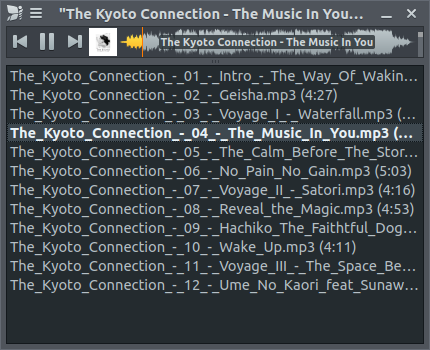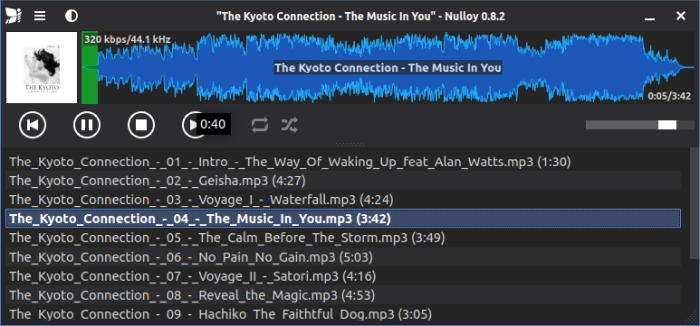Last Updated on September 1, 2020
In operation
Here’s an image of Nulloy in action.

It’s most prominent attribute is that it creates a waveform of each track based on the audio data. So each progress bar is unique. The waveforms are stored in the ~/.nulloy/nulloy.peaks file. This skin doesn’t show repeat and shuffle buttons, but they are accessible in the other skins.
The software plays all the audio formats supported by Gstreamer. FLAC, MP3, OGG Vorbis, WMA and others are therefore supported. Almost all my collection is stored in FLAC, but I appreciate music enthusiasts use a wide range of codecs.
You can populate your tracks by adding files or directories.
There’s adequate support for playlists. You can create and save playlists. There’s shuffle repeat, as well as loop functionality. Playlists are saved in M3U, a popular computer file format for a multimedia playlist.
More important (for me) functionality is support for gapless playback. Gapless playback is the uninterrupted playback of consecutive audio tracks, such that relative time distances in the original audio source are preserved over track boundaries on playback. It’s an essential feature if, like myself, you listen to classical, electronic music, concept albums, and progressive rock.
ps_mem reports that Nulloy uses around 74MB of RAM in general usage. ps_mem is a really useful utility that accurately reports memory usage of software.
Next page: Page 3 – Other Features
Pages in this article:
Page 1 – Introduction / Installation
Page 2 – In Operation
Page 3 – Other Features
Page 4 – Summary

Its broke system
For Ubuntu 20.04, I had to install these different packages:
qt5-qmake instead of qt4-qmake;
qtbase5-dev instead of libqt4-dev;
qtbase5-private-dev qtscript5-dev qttools5-*;
There was no need to export the variables;
This waveform feature saved me a lot of time in audio analysis.